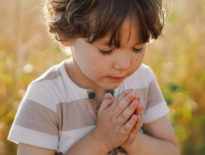When faced with great tragedies, the most overwhelming feeling is one of helplessness. What can we do to change the lives of the hurting for the better? How can we help when not even the strong can find solutions? The answer is not simple, but it is more accessible than we might believe if it includes empathy, courage, and the faith that any help, no matter how small, is not in vain.
The chances of survival for a baby born in war-stricken Syria today are higher than for one born in the Venezuela of recent years, plagued as it is by hunger, the lack of basic medical care, and street violence.
Since the beginning of the present humanitarian crisis, three quarters of the population lost on average eight kilograms each due to lack of food. It is not unusual to see people walking down the hallways of hospitals with candles in hand, due to power failures.
Worthless bills hang on the trees or flutter down the streets due to an inflation rate that has exceeded one million percent. Out of sheer desperation, over three million inhabitants left Venezuela over the last four years. The idea that a once-prosperous, democratic country, untouched by war, can end up in such a collapse was unimaginable. International help was denied by the president, and internal solutions did not have the expected results.
Faced with this grim and seemingly hopeless situation, people around the world refused to stand helplessly on the side-lines. They gathered up resources and did everything in their power for these resources to reach Venezuela. While these efforts might not have changed the statistics, it brought hope to the people of Venezuela and the confidence that they were not forgotten.
Martha Convers left Venezuela 15 years ago and is a real-estate agent and Zumba trainer in the US. She kept in contact with her friends back home, so she knew very well the problems they had to face when the crisis struck. She did not really know how to help. Her income was not big enough to cover their needs.
When a friend at the church she had attended in Venezuela told her about the problems they were facing at the high school where he was teaching, she realized she could do something. Norman Canaie, an English teacher in Caracas, told her that some students came to school barefoot and others had stopped coming altogether because they had no shoes. Because they barely had enough money to buy food, the idea of buying a pair of shoes was simply out of the question. Moreover, a good pair cost more than a month’s salary.
Martha started collecting donated shoes from those she knew. In the first month she received more than 200 pairs. With a lot of effort, she managed to send them to Caracas. A special pair of sports shoes reached a student who had dropped out of school, ashamed of his worn out shoes. “The children were overwhelmed with the shoes. They’re always asking me if there are more shoes coming,” Norman said.
The request for shoes was also shared on social media, and Martha was joined by several volunteers who wanted to help her. Most of them have family and friends in Venezuela, and this way of helping brings them satisfaction. Since the end of 2017, Martha and her volunteer team have sent over 3,000 pairs of shoes to Venezuela. She hopes that the transportation of these shoes, which has become more and more uncertain, will not become a problem in the future. Above all, she hopes and prays that the situation in Venezuela will return to normal so that those back home at least get chance at a decent living.
Maria del Pilar Figueroa lives in Colombia, one of the countries neighbouring Venezuela. Each day, around 30,000 Venezuelans cross the border to Colombia to flee from the hunger in their country. However, the road to the country’s capital, Bogotá, where they can find work, is a difficult one. After crossing the border, the refugees need to take a road that goes over the mountains, which most choose to do on foot because they have no money for a bus ticket.
Their road over the 3,200-meter-high mountain lasts 8 days, and low temperatures make the effort even harder. Humanitarian organisations have set up camps at the foot of the mountain to equip people with what they need to survive.
Maria, together with her two children, live on the most difficult point along the road, in La Laguna. Her daughter was deeply moved by the deplorable state of those who passed through their village: starving children, barefoot people with small bags on their backs. Her daughter sold a precious necklace to buy food for the refugees.
Maria thought she might help with a warm meal and shelter for the night whenever necessary, so she began cooking for those passing through La Laguna. Soon, nongovernmental organizations began to support her efforts, so she gave up work and is currently only working to help Venezuelan refugees.
Her life and her children’s lives changed dramatically when they began to help. Up until that point, all her children did in their free time was play and watch TV. Now they are their mother’s right hand. Early in the morning, they sit together and peel vegetables for the warm meal of the day. Around 150 people pass by the shelter daily.
During mealtime, Maria listens to the people’s stories. It is hard for her to understand how highly educated, previously well-employed people struggle to provide for their families. She has compassion on those who have left their small children back home, in the care of relatives, hoping they will quickly raise money to be able to bring their children back with them. She is troubled by stories of hunger, poverty, and despair: “I’ve been through a lot of situations. I had to be a nurse, a psychologist, a nanny, even a surrogate mother. A lot has happened to me and I learned a lot.”
Not everyone who crossed her doorstep was polite, and her efforts were not always appreciated. Fatigue and frustration pile up. But she is grateful she can be of service, because she learned a great deal from the refugees. The prayers of many when leaving her shelter have come true, and the satisfaction of knowing that she has contributed a meal and a warm place to sleep for their comfort is enough.



















